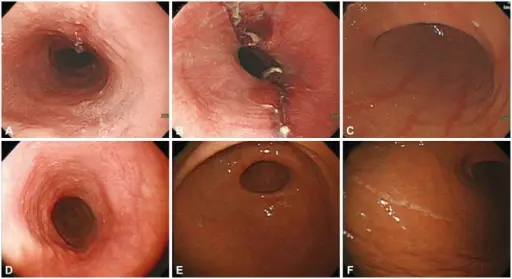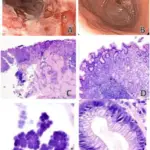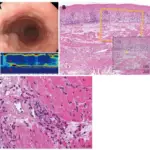Chemical esophagitis is esophageal mucosal injury caused by the medications and usually refers to a direct toxic effect on esophageal mucosa by the culprit medication.
What is the Pathology of Esophagitis?
The pathology of esophagitisis:
-Etiology: The cause of esophagitisis may be due to stomach acids backing up into the esophagus, infection, oral medications and allergies.
-Genes involved: CAPN14.
-Pathogenesis: The sequence of events that lead to esophagitis are reflux of gastric contents are passively regurgitated into the esophagus. Gastric acid, pepsin, and bile irritate the squamous epithelium, leading to erosion and ulceration of esophageal mucosa. Eventually, a columnar epithelial lining may develop. This lining is a premalignant condition termed Barrett esophagus.
-Histology: The histology associated with esophagitis shows intraepithelial eosinophils in at least one high-power field HPF, and alterations in the epithelium and subepithelial connective tissue.
How does Esophagitis Present?
Patients with esophagitis typically more in males and present at age younger than 50 years. The symptoms, features, and clinical findings associated with esophagitis include difficult swallowing, painful swallowing, and chest pain.
How is Esophagitis Diagnosed?
Esophagitis is diagnosed by physical examination and several tests, endoscopy, and biopsy.
How is Esophagitis Treated?
Esophagitis is treated by medications that may include antiviral medications, antifungal medications, antacids, pain relievers, oral steroids, proton pump inhibitors.
What is the Prognosis of Esophagitis?
The prognosis of esophagitis is good.



